Nunca tente descobrir como duas pessoas estão relacionadas em uma família árabe, a menos que esteja preparado para ouvir uma longa e detalhada aula de genealogia que, de alguma forma, abrange várias gerações e pelo menos três primos. Um simples "tio" ou "primo" nunca é suficiente – cada resposta vem acompanhada de um breve histórico da árvore genealógica e, quando terminam, você pode até ter esquecido por que perguntou. 😅
Na cultura árabe, a família não se resume apenas a parentes próximos; é uma rede vasta e interconectada onde todos parecem conhecer-se – ou pelo menos fingem que sim. 🙂 Os laços familiares não são apenas biológicos; eles formam uma estrutura social que influencia os relacionamentos e interações. Importa saber se alguém é parente pelo lado materno ou paterno, se é mais velho ou mais novo, e isso reflete-se nos termos precisos usados para se dirigir a eles. Por exemplo, os termos para "tio" e "tia" são muito mais específicos do que em muitas outras línguas, variando conforme o lado da família e a posição na hierarquia familiar. O respeito pelos mais velhos é especialmente importante, razão pela qual um irmão mais novo pode ser chamado de "Pequeno Pai" (Abu X), ou um irmão mais velho pode receber um título que denote honra e status.
Se queres aprender Mãe em árabe e Pai em árabe, o melhor é começar pelo básico. Mãe em árabe é أم (Umm), enquanto Pai em árabe é أب (Ab). A partir daí, um sistema completo se desenrola, onde cada parente tem um nome específico com base na sua posição exata na família. Se tens curiosidade sobre como os árabes se referem aos seus familiares – e queres evitar chamar acidentalmente um desconhecido de “tio” – continua a ler! 😃
If you want to deepen your knowledge of Arabic, try the PixiLearn Arabic learning app, where you can learn Arabic words and phrases in a fun and interactive way. Download it now and start learning! Learn Arabic words with PixiLearn
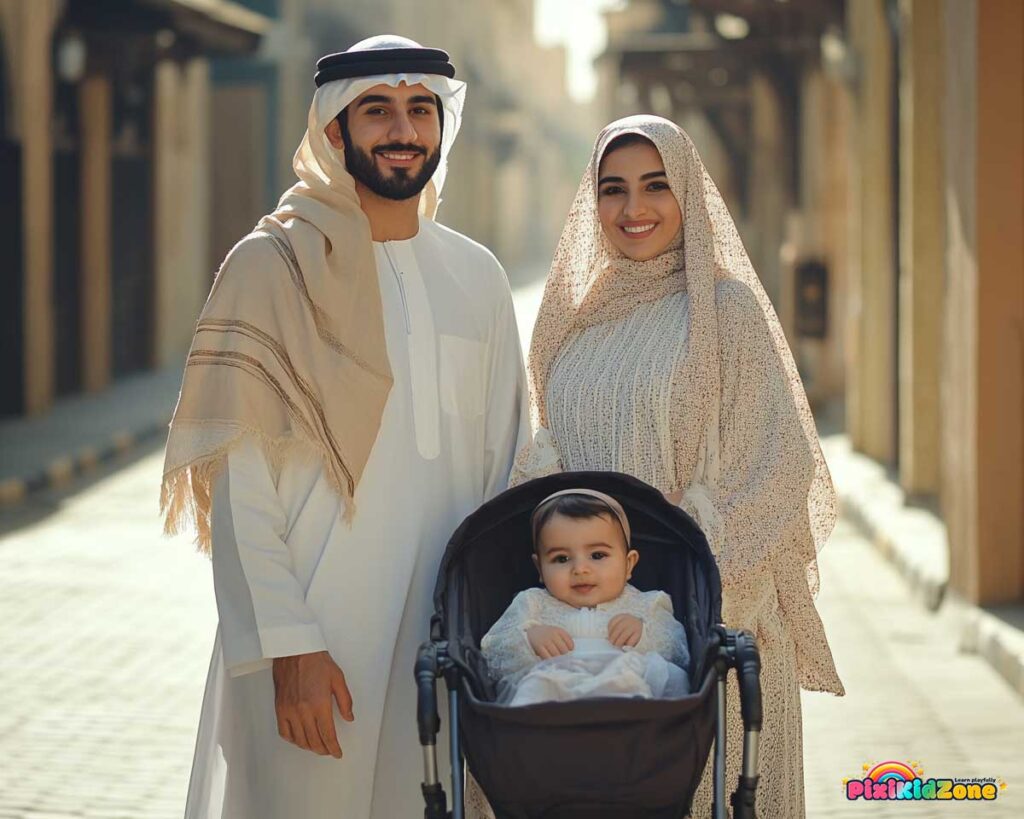
Mãe em árabe e Pai em árabe
Mãe em árabe – أم (Umm)
Em árabe, a palavra para mãe é أم (Umm), pronunciada como “Omm”.
As mães desempenham um papel central na cultura árabe, sendo frequentemente vistas como o coração da família. A língua árabe reflete esse profundo respeito através de títulos afetuosos como “Umm + nome do filho mais velho”, onde a mãe às vezes é chamada pelo nome do seu primogênito, como Umm Ahmed (mãe de Ahmed).
Pai em árabe – أب (Ab)
A palavra árabe para pai é أب (Ab), pronunciada como “Ab”.
Na cultura árabe, os pais são tradicionalmente vistos como a cabeça da família, responsáveis pela orientação e apoio. Assim como as mães, os pais também recebem títulos honorários, geralmente “Abu + nome do primogênito”, como Abu Khalid (pai de Khalid), simbolizando seu papel e status dentro da família.
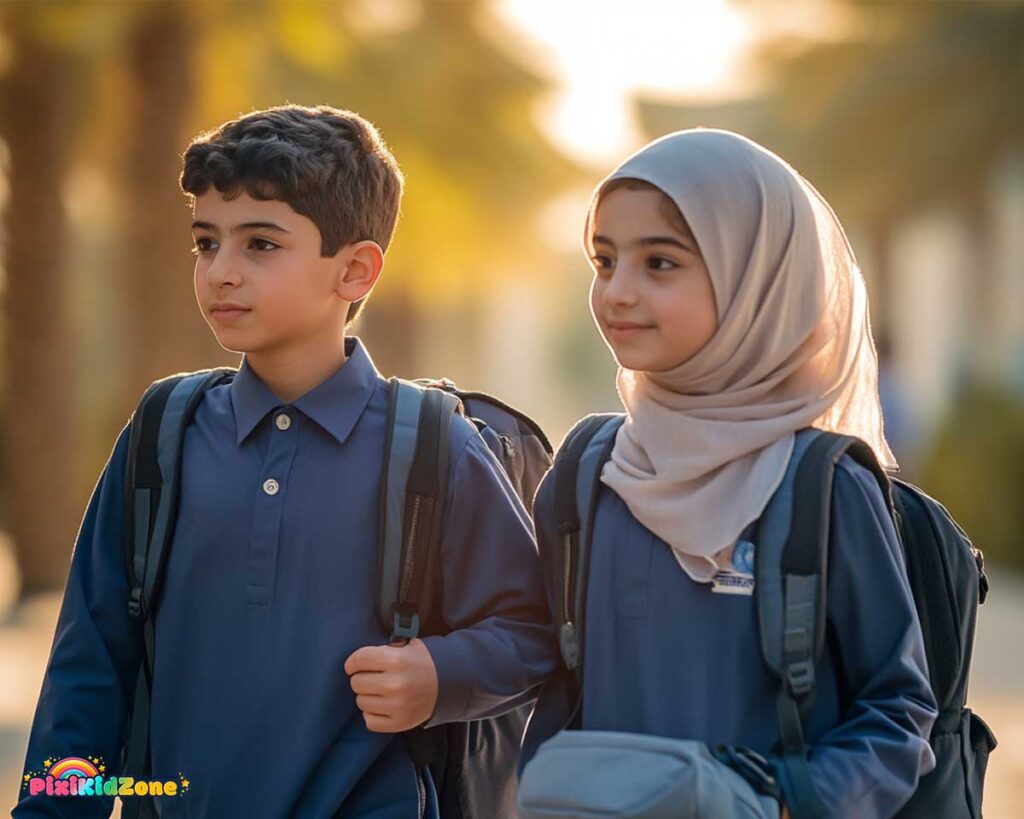
Filho em árabe e Filha em árabe
Filho em árabe – ابن (Ibn)
Em árabe, a palavra para filho é ابن (Ibn), sendo pronunciada como “Ibn” ou “Bin” em certos dialetos.
O termo Ibn não é usado apenas em conversas familiares do dia a dia, mas também aparece em contextos históricos e formais, como em nomes (por exemplo, Ibn Sina, que significa Filho de Sina). Na sociedade árabe tradicional, os filhos são frequentemente vistos como portadores do nome e do legado da família.
Filha em árabe – بنت (Bint)
A palavra árabe para filha é بنت (Bint), pronunciada como “Bint”.
Ao contrário de Ibn, que é frequentemente usado em nomes completos, Bint aparece em referências genealógicas, como “Bint Ali”, que significa Filha de Ali. Historicamente, o termo era utilizado em famílias nobres para destacar a ascendência. Em muitas famílias árabes, as filhas ocupam um lugar especial e frequentemente recebem apelidos carinhosos.
Arabic Word for Brother and Sister
Brother in Arabic – أخ (Akh)
In Arabic, the word for brother is أخ (Akh), pronounced as “Akh” (with a soft “kh” sound, like the German “Bach”).
In Arab culture, the bond between siblings is highly valued. An older brother (Akh Kabeer – أخ كبير) often takes on a protective and guiding role within the family, while younger brothers (Akh Sagheer – أخ صغير) are expected to show respect and follow their elders’ advice.
Sister in Arabic – أخت (Ukht)
The Arabic word for sister is أخت (Ukht), pronounced as “Ukht”.
Sisters hold a special place in Arab families, often taking on nurturing roles. An older sister (Ukht Kabeera – أخت كبيرة) is traditionally viewed as a second mother, offering guidance and care, while younger sisters (Ukht Sagheera – أخت صغيرة) are usually pampered and protected by their siblings.
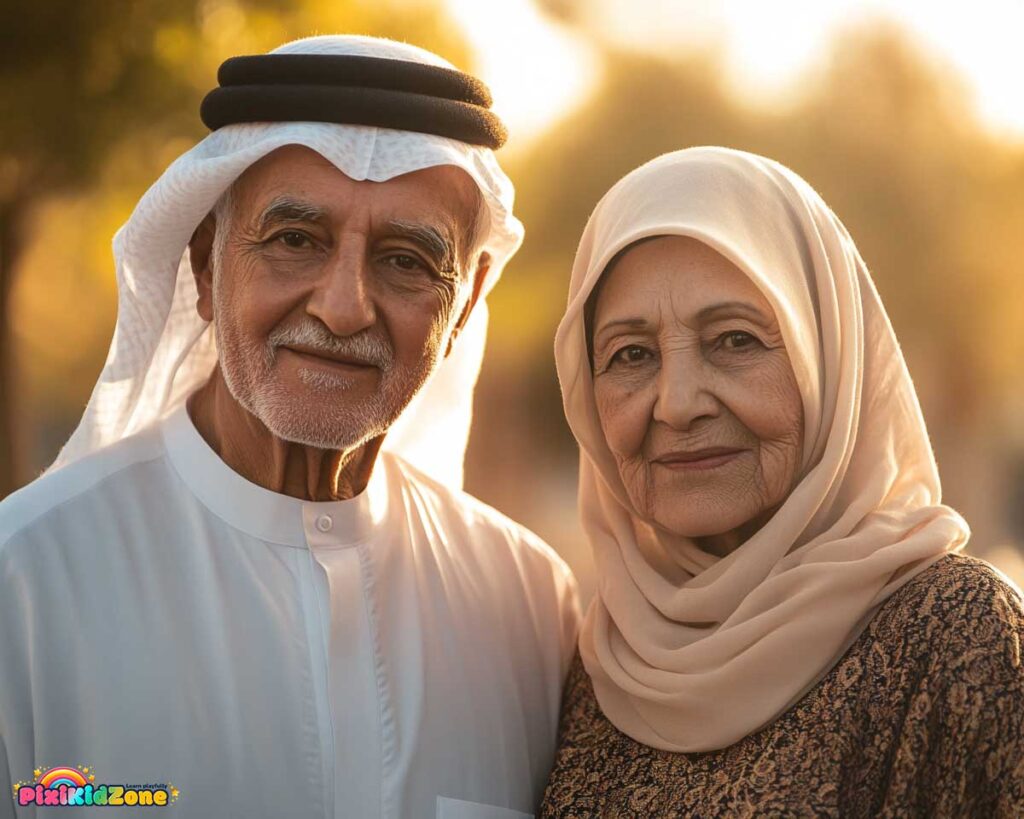
Arabic Word for Grandfather and Grandmother
Grandfather in Arabic – جد (Jadd)
In Arabic, the word for grandfather is جد (Jadd), pronounced as “Jadd”.
Grandfathers are highly respected in Arab families, often seen as the family’s wisdom keepers. They play an important role in passing down traditions, stories, and values. In some regions, affectionate terms like “Jiddi” (جدي) or “Sidi” (سيدي) are used to address grandfathers, reflecting deep respect and closeness.
Grandmother in Arabic – جدة (Jadda)
The Arabic word for grandmother is جدة (Jadda), pronounced as “Jadda”.
Grandmothers are often the heart of the household, known for their hospitality and love, especially when it comes to cooking! In some dialects, grandmothers are lovingly called “Teta” (تيتا) or “Jiddati” (جدتي). Their role extends beyond the family, as they often serve as the unifying force keeping multiple generations connected.
Arabic Word for Uncle and Aunt
Uncle in Arabic – عم (Am) / خال (Khal)
In Arabic, there are two different words for uncle, depending on whether he is from the father’s or mother’s side:
- عم (Am) – Paternal uncle (father’s brother), pronounced as “Am”
- خال (Khal) – Maternal uncle (mother’s brother), pronounced as “Khal”
Uncles often play a significant role in Arab families, acting as second fathers. The عم (Am), being from the father’s side, is often seen as an authoritative figure, while the خال (Khal) is traditionally known for being more affectionate and easygoing.
Aunt in Arabic – عمة (Amma) / خالة (Khala)
Just like with uncles, Arabic distinguishes between aunts from the paternal and maternal sides:
- عمة (Amma) – Paternal aunt (father’s sister), pronounced as “Amma”
- خالة (Khala) – Maternal aunt (mother’s sister), pronounced as “Khala”
Aunts, especially maternal ones (Khala), often take on a nurturing and caring role in a child’s life. The “Khala” is sometimes considered a second mother, while the “Amma” can hold a more traditional role within the extended family structure.
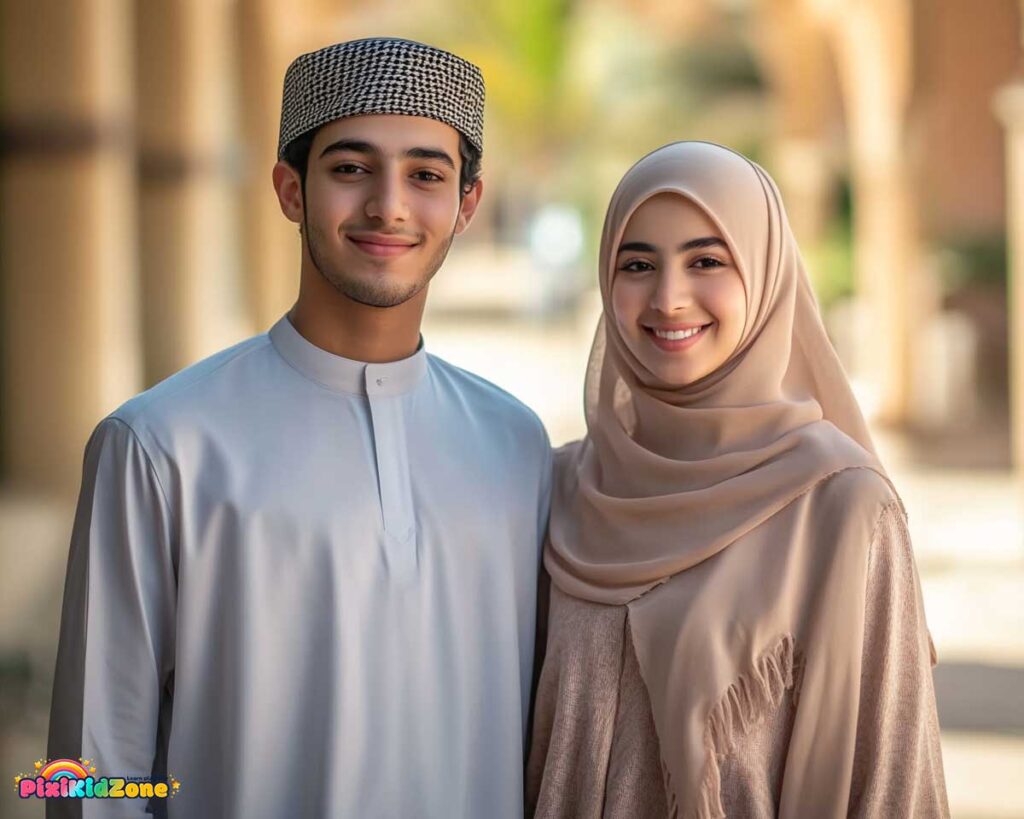
Arabic Word for Cousin (Male and Female)
Male Cousin in Arabic – ابن عم (Ibn Am) / ابن خال (Ibn Khal)
In Arabic, the word for male cousin depends on whether he is from the father’s or mother’s side:
- ابن عم (Ibn Am) – Paternal cousin (father’s brother’s son), pronounced as “Ibn Am”
- ابن خال (Ibn Khal) – Maternal cousin (mother’s brother’s son), pronounced as “Ibn Khal”
Cousins in Arab families are often as close as siblings, and in some cases, they even grow up together. Historically, in many Arab cultures, paternal cousins (especially Ibn Am) were considered potential marriage partners due to strong family ties and traditions.
Female Cousin in Arabic – بنت عم (Bint Am) / بنت خال (Bint Khal)
Similarly, the word for female cousin also changes depending on which side of the family she is from:
- بنت عم (Bint Am) – Paternal cousin (father’s brother’s daughter), pronounced as “Bint Am”
- بنت خال (Bint Khal) – Maternal cousin (mother’s brother’s daughter), pronounced as “Bint Khal”
Female cousins share a special bond in Arab families, often being treated as sisters. Just like with male cousins, Bint Am was traditionally seen as a close family connection, sometimes even a future spouse in arranged marriage traditions. However, in modern Arab society, cousin relationships are more about family unity and lifelong friendships.
Arabic Word for Grandson and Granddaughter
Grandson in Arabic – حفيد (Hafeed)
In Arabic, the word for grandson is حفيد (Hafeed), pronounced as “Hafeed”.
Grandsons hold a special place in Arab families, often being cherished and spoiled by their grandparents. In many cases, grandparents play an active role in raising and mentoring their grandsons, passing down traditions, stories, and wisdom.
Granddaughter in Arabic – حفيدة (Hafeeda)
The Arabic word for granddaughter is حفيدة (Hafeeda), pronounced as “Hafeeda”.
Granddaughters are equally adored, often receiving special attention from their grandmothers, who teach them family traditions, cooking secrets, and cultural values. In some Arab families, the first granddaughter even takes on a special role as the “little queen” of the household, bringing joy to everyone.
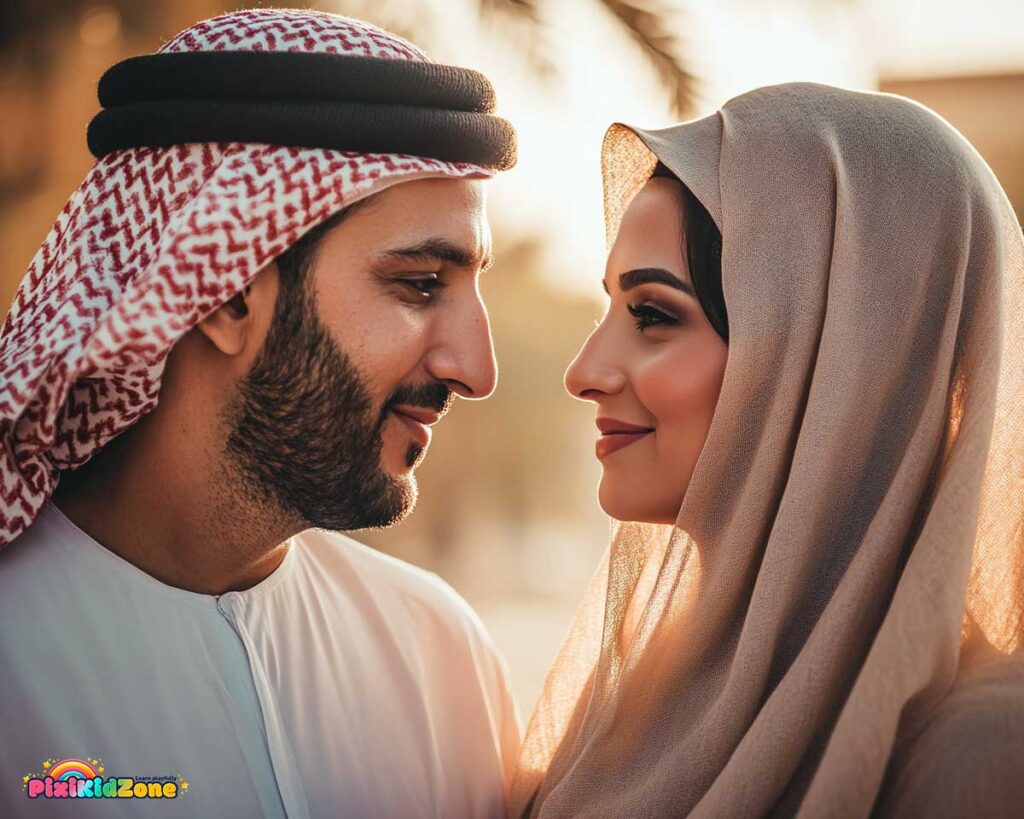
Arabic Word for Husband and Wife
Husband in Arabic – زوج (Zawj)
In Arabic, the word for husband is زوج (Zawj), pronounced as “Zawj”.
Marriage is highly valued in Arab culture, and the role of a husband extends beyond being a life partner—he is traditionally seen as the provider and protector of the family. The word “Zawj” can also mean “pair” in Arabic, emphasizing the idea of partnership and unity in marriage.
Wife in Arabic – زوجة (Zawja)
The Arabic word for wife is زوجة (Zawja), pronounced as “Zawja”.
Wives in Arab families hold an essential role, often seen as the heart of the home. In many traditional settings, the wife is responsible for maintaining family bonds, raising children, and preserving cultural traditions. The word “Zawja” comes from the same root as “Zawj”, reinforcing the idea that husband and wife are two halves of a whole.
Now You Know How to Address Someone in Arabic!
Learning Arabic family terms is not just useful for language learning—it’s a real cultural gateway. In Arab families, kinship ties mean much more than just blood relations—they shape social interactions, forms of respect, and even daily greetings.
If you ever visit an Arab family, you won’t be surprised to find that uncles and aunts have different specific titles, or that “Abu” and “Umm” (Father and Mother) are often followed by the name of their firstborn child. And if you ever ask, “How are these two related?”, you’ll quickly realize that it’s best to sit down and grab a notebook.
Now that you know the most important Arabic family words, maybe it’s time to try using them in a conversation. Who knows? The next time an Arab grandmother smiles at you, you might just know exactly how to address her. 😉
Já leu estes?
Queres aprender mais sobre o árabe egípcio? Descobre que língua os egípcios realmente falam! https://pixikidzone.com/pt/blog/speak-the-egyptian-language-but-wait-what-language-do-they-actually-speak/
Curioso para saber como perguntar "Como estás?" em árabe? Aprende as formas mais educadas! https://pixikidzone.com/pt/blog/arabic-for-how-are-you-learn-how-to-ask-politely/
Já te perguntaste sobre palavrões em árabe? Descobre-os, desde o dialeto marroquino até o do Golfo, com pronúncia! https://pixikidzone.com/pt/blog/swear-words-in-arabic-from-moroccan-to-gulf-with-pronunciation/

 Português
Português



 English
English 简体中文
简体中文 Español
Español Deutsch
Deutsch Magyar
Magyar Русский
Русский Français
Français हिन्दी
हिन्दी العربية
العربية











